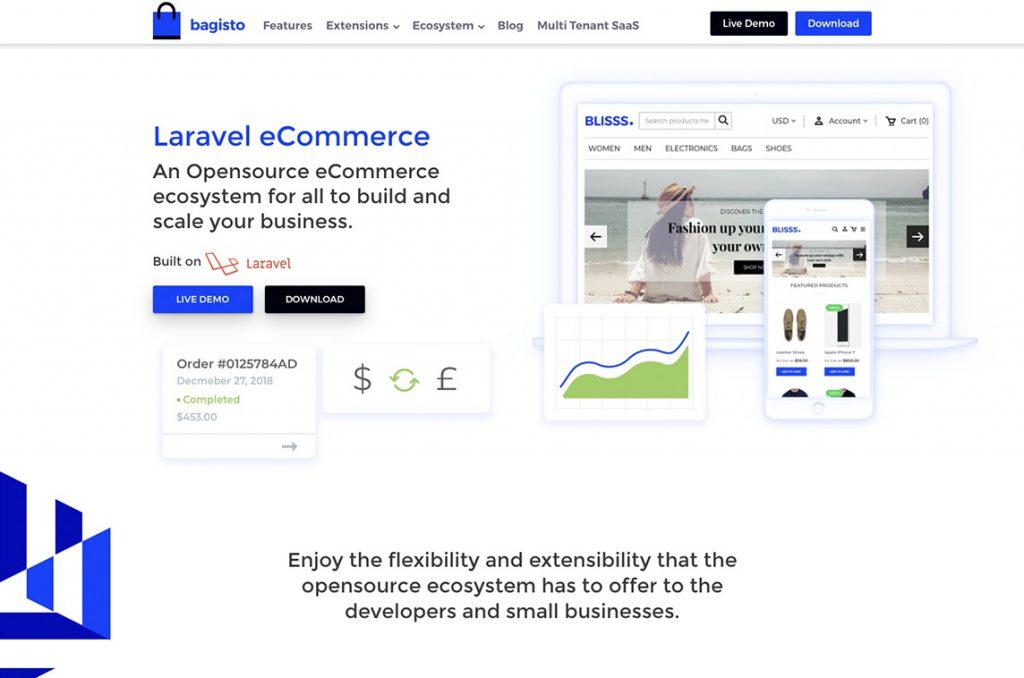It’s a no-brainer that online shopping is now seen as significantly better to people across the world, with the ongoing pandemic. But does that mean that your online stores are more equipped than before to handle more traffic, provide better customer experience, and have a seamless checkout process? With huge growth in digital shopping over the past few years, and even more overwhelming in 2021, the need for quick, easy, and powerful eCommerce framework solutions are more than ever before. Therefore, for a small retailer or a medium-scale business owner, it isn’t easy to spot the right eCommerce software to keep your online store up and running, given the saturation of the market with overpriced and average products. However, there are a few open-source, heavy-duty eCommerce softwares available online that have been the primary resource of many mainstream, successful corporations.
As a digital shop-owner you need to choose solutions that can:
a. Deliver seamless, out-of-the-crowd customer experience as well as be efficient in operations
b. Go well with your marketing strategies, and contribute to keep it optimal
c. Scalable, user-friendly, and apt for the long term
Easier said than done, the stakes are too high for any business owner for running a successful eCommerce store online. While there are thousands of different eCommerce solution providers online, you may find that the open-source eCommerce platforms are powerful and easy-to-use when you’re starting from scratch or migrating. These inexpensive, corporate-grade eCommerce store builders are put together and managed by developers across the world, thus having ample step-by-step blogs and guides available to set you right up and help you out in any situation.
While large and successful corporations like Kylie Cosmetics have their entire digital storefront set on Shopify, brands like Nike and Cisco choose to go with Magento – a powerful, open-source eCommerce platform. Be it customizability or scalability, you can’t go wrong with open source eCommerce platforms, even when you’re in it for the first time! Extra brownie points for its solid community support that makes lives easy for all.
While it’s entirely your call to choose the eCommerce software for your online store, let’s talk about some of the serious open-source, eCommerce platforms that take their jobs seriously, even in 2021:
1. Top in Overall – WooCommerce
Used worldwide as the most-preferred eCommerce software for WordPress websites, this online storefront was developed by Automattic in March 2015, and since then has taken over a large share of the market. Its easy-breezy integration, efficient management, wide variety of attractive templates, unique scalability, and an exclusive mobile app that brands can create with an add-on installation especially for mobile/tablet users is a real deal here. For a beginner shop owner already having a WordPress website, they can set up their online store as soon as they install the WooCommerce plugin, which is perfectly free for commercial and personal use. However, they would also need the expenses of domain, hosting, themes, emails, support sorted out first prior to beginning their sales. To add more flair to your online store, you might need to add a few paid extensions on the long run, but it’s totally worth it!
A lot many of you might be wondering, What about non-WordPress websites? Well, WooCommerce is only compatible with WordPress websites, and delivers a stable, fast CMS, equipped with a customized checkout option; but there’s other equally good eCommerce open source platforms to get you started.
2. Best ShopBuilding Experience – Magento
Credits: Magento
An industry leader when it comes to mobile eCommerce solutions that, according to Alexa, is used by 25% of all online stores worldwide, it is known for its streamlined B2B approval workflows, ability to handle refined inventory management, easy customizations, quick Progressive Web App development, and so much more. However, there’s a catch. If you’ve a well-established business that gets a decent amount of transactions everyday, and you aren’t a beginner in the marketplace, this eCommerce platform might be the perfect for you as it has a robust end-to-end system that can seamlessly handle upto thousands of transactions each minute. It might also require some level of expertise in coding and programming for getting started and afterwards for making the most out of it.
If you’re in for a good learning experience, and cater to all domains across B2B, B2C, and even hybrids, going with Magento would be the right thing to do on your part.
3. Top Choice in Customizability – Bagisto
Credits: MadewithNetwork
Normally used by websites made out of PHP Laravel and Vue.js, Bagisto is known for that hand-tailored eCommerce experience to your customers, especially when you’re a startup. It comes equipped with compelling SEO functionalities, RTL support that cuts back on your time and costs. The CMS is a fast, and one-click management interface that can link, organize, and track your inventories across multiple channels in a single place, making it a go-to for entrepreneurs and brands who want speed.
4. Best in ASP.NET-based eCommerce store – nopCommerce
Credits: GitHub
Based on ASP.NET, nopCommerce is a popular open source eCommerce platform known for its secured carts and scalability. It’s easy-to-learn platform comes with useful features that make it handy for small and large enterprises alike. The rich design and features make this platform stand out from other solutions, and comes without any license fee unlike other open source solutions. The impressive features, community-based support, along with extendable and stable shopping cart functionality puts out a promising solution that can further be enhanced with a wide range of possibilities.
5. Top in comprehensive eCommerce platforms – Drupal Commerce
Credits: Drupal.org
A PHP open source eCommerce platform in its core, it provides a powerful interface and is highly extensible according to your business requirements. The rich and unique eCommerce functionalities along with multiple payment and shipping options, Drupal offers a simple yet solid CMS, complete with an all-round administration system having functionalities like multiple currency checkout options. It can also record orders, payment methods, invoices, as well as its shipping and payment methods chosen by your customers for better management. However, this open-source eCommerce platform is specially designed for professionals or developers to feel right at home, and therefore can get tough for a beginner to absorb without support. It’s in-built caching mechanism and security system keeps your online store fast, secured and operating at its optimum.
That’s All Folks!
We get it. 2020 has been and 2021 will be a handful for people across the world, and the last thing you need is to fall behind on your business. However, with the eCommerce industry experiencing a massive rise than before, you’d need a cost-effective, tough-grade, highly usable open-source CMS complete with impressive functionalities to give your digital store the direction it needs. The above compilation was based on the results and reviews of many large-to-small business owners over the time, and in recent history that stands best in delivering conversions.
If you need to hire an eCommerce developer for one of the above listed platforms, here are our recommendations:
- Lounge Lizard- A New York City based firm, they offer a variety of design and eCommerce development services, and can work on many of the platforms listed here.
- Absolute Web- A US based development firm with more than 20 years of experience, they’re an eCommerce development focused firm, and because platforms like we’ve listed in this blog are their bread and butter, you’re sure to be set right.
- CodeClouds- A global company, they offer the best of onshore and offshore- low costs with better support. They also can work on many of the eCommerce platforms listed here, and offer dedicated offshore developer packages to keep costs down.

Problem solver. Incurable bacon specialist. Falls down a lot. Coffee maven. Communicator.








